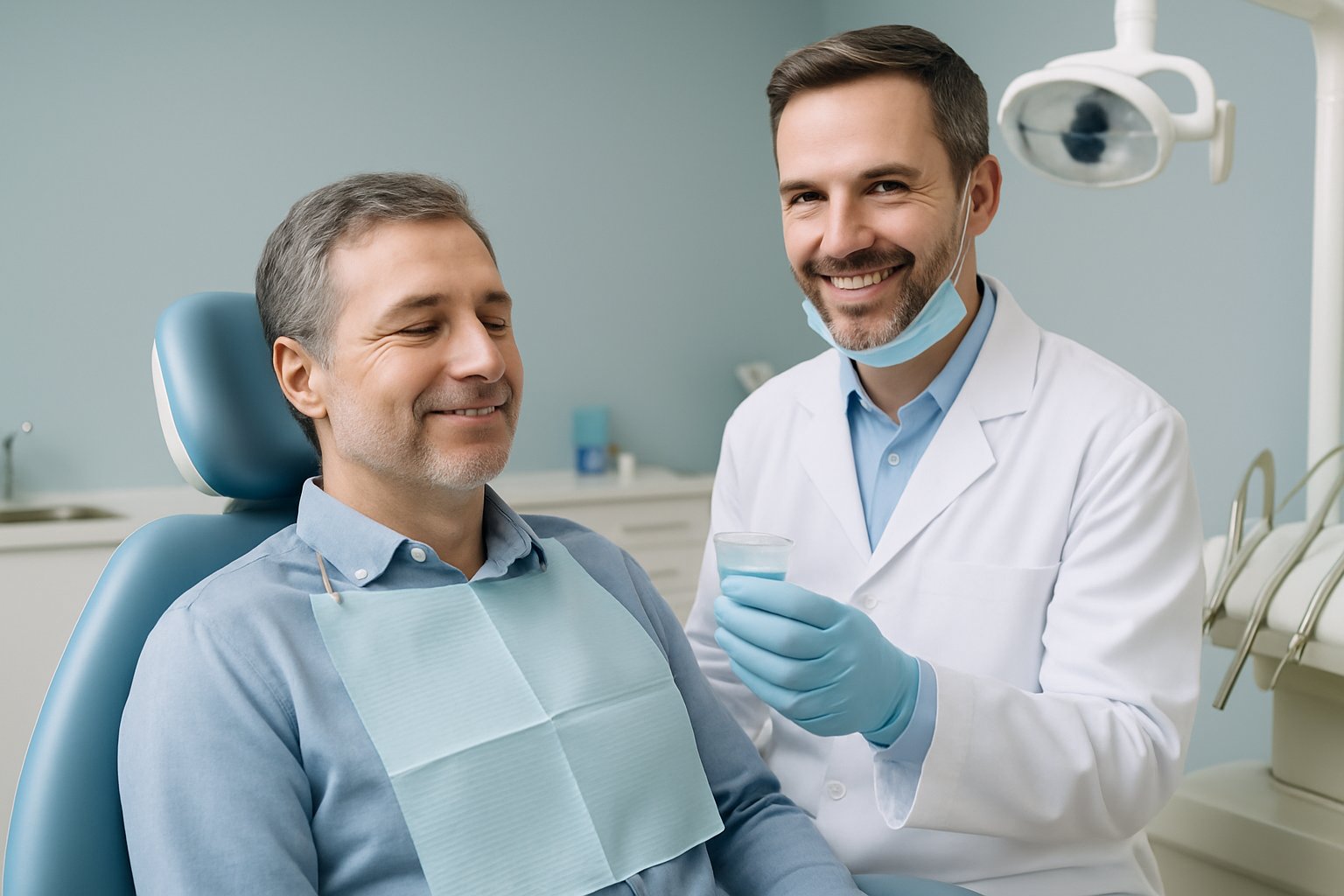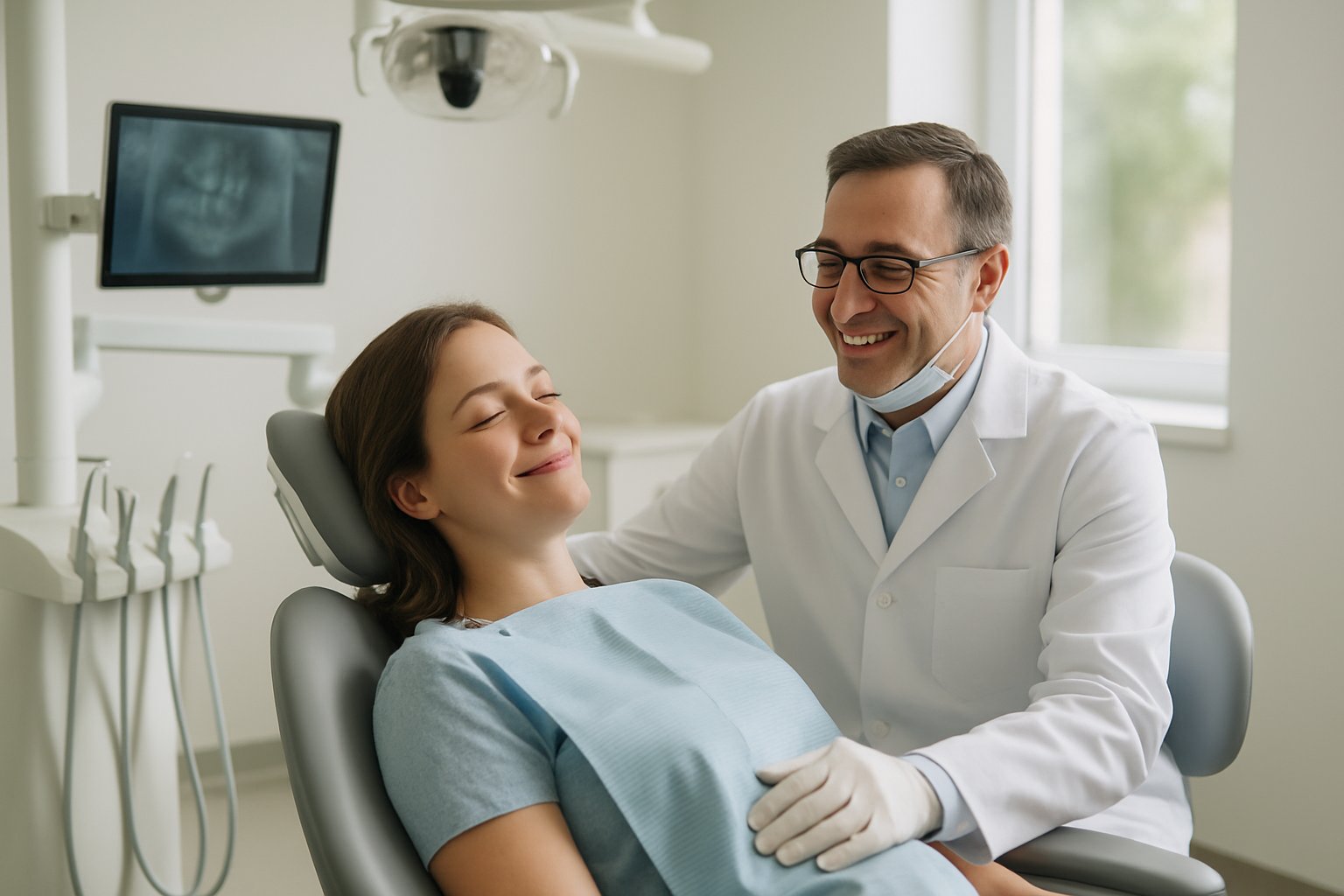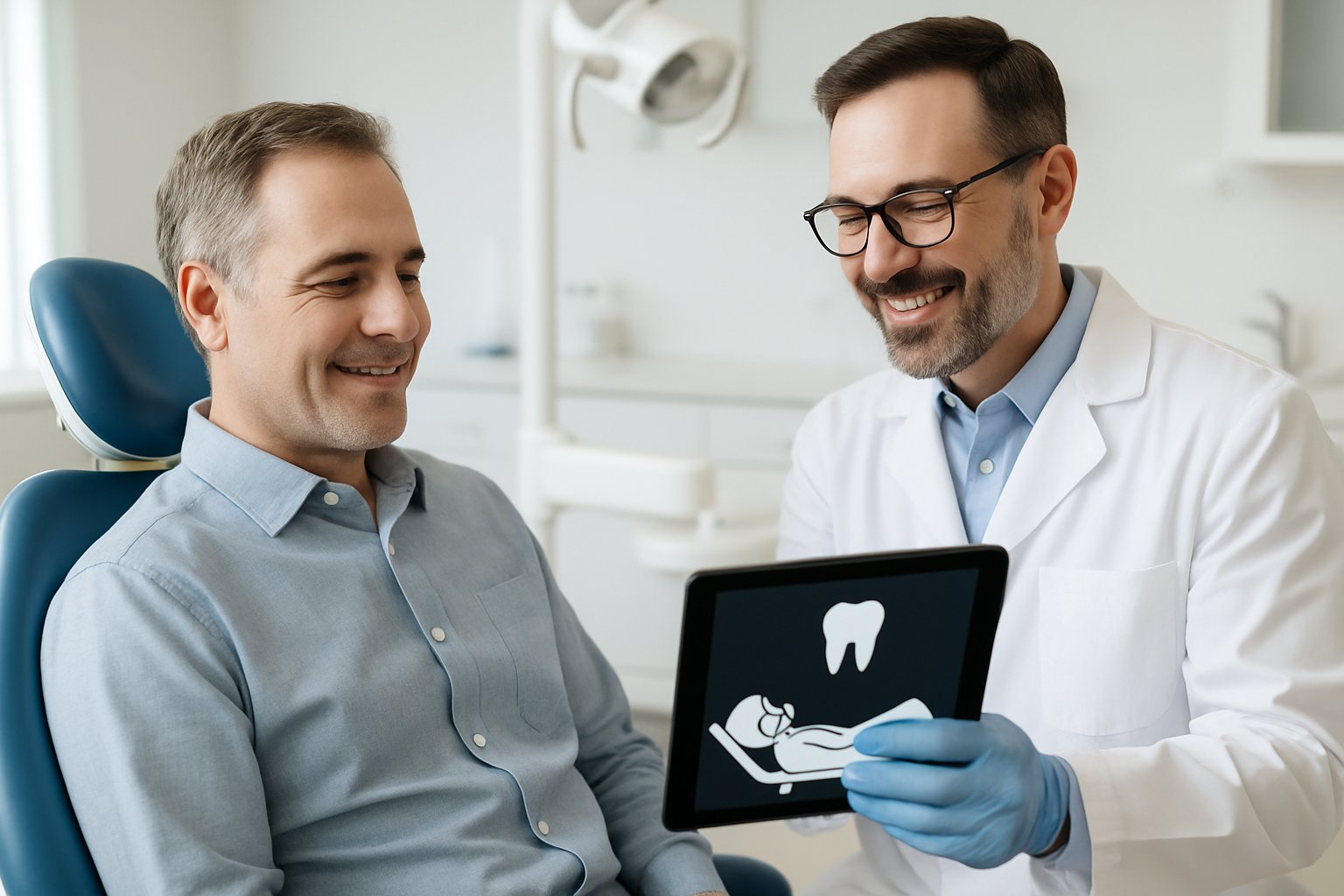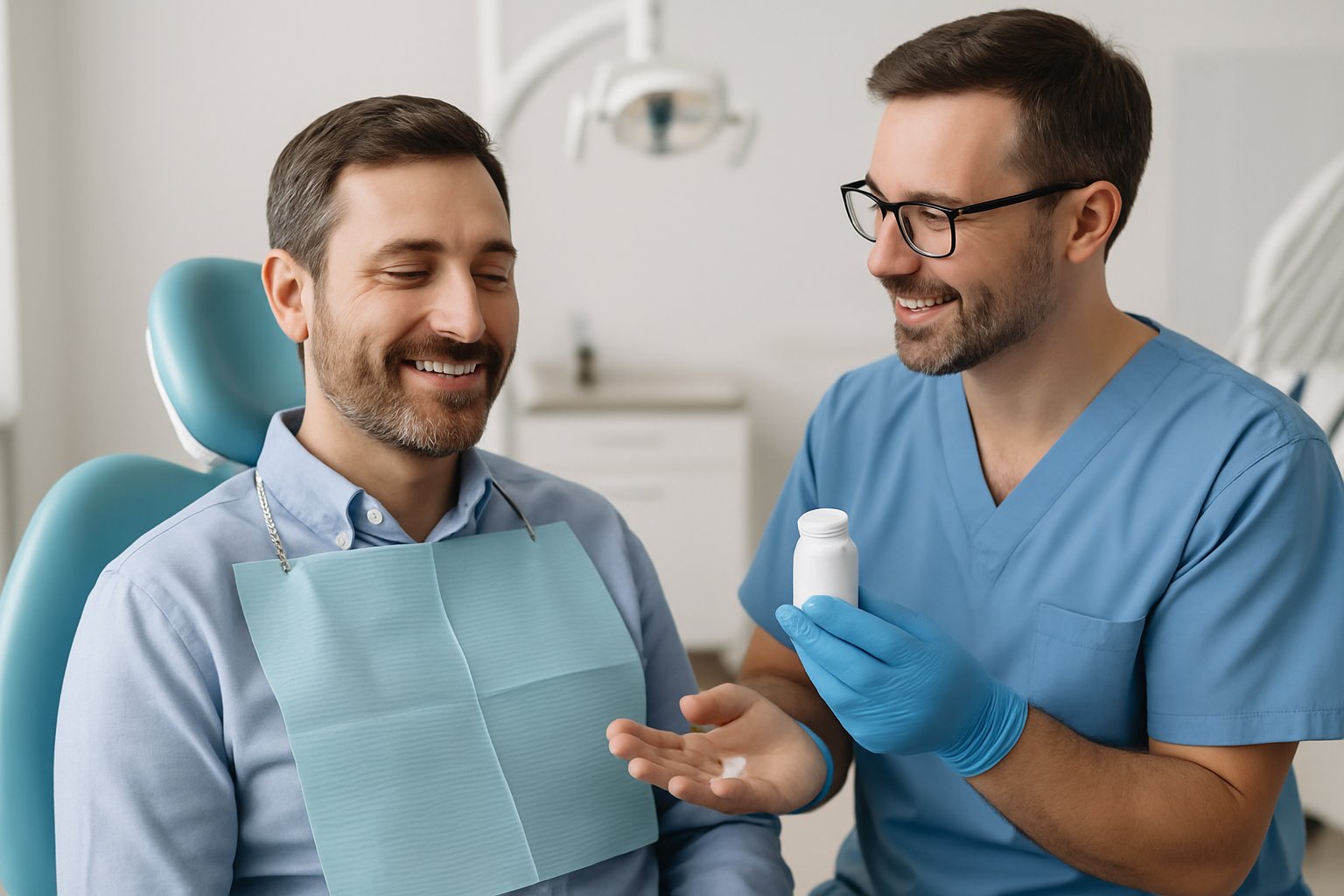What is Oral Conscious Sedation?
Going to the dentist can feel scary, especially if you need a big procedure. Many people worry about pain or anxiety during treatment.
Oral conscious sedation helps you stay calm and relaxed while you remain awake and able to respond to your dentist.

This sedation uses medicine you take by mouth before your appointment. It makes you feel drowsy and less worried.
You won’t fall asleep completely, but you’ll feel much more comfortable. Understanding the process helps you feel prepared and confident about your dental care.
Key Takeaways
- Oral conscious sedation uses pills to help you relax during dental procedures while you stay awake.
- Your dentist will give you instructions about eating, drinking, and taking the medicine before your visit.
- You need someone to drive you to and from your appointment since the medicine affects your coordination.
Understanding Oral Conscious Sedation

Dentists use oral conscious sedation with pill medications to help you relax during procedures. The sedatives keep you awake but calm, so you feel less anxious.
What Is Oral Conscious Sedation?
Dentists use this safe method to help anxious patients feel relaxed during treatment. You take a pill before your appointment.
You stay awake and can answer questions during the procedure. The medication makes you feel sleepy and less worried.
This type of sedation works well for people with dental anxiety. It’s different from being put completely to sleep.
Key features of oral conscious sedation:
- You remain conscious and aware.
- You can follow simple instructions.
- You breathe on your own.
- You may not remember much of the procedure.
The effects last several hours after you take the medication.
How Oral Conscious Sedation Works
The oral sedative calms your central nervous system. You usually take the pill 30 to 60 minutes before your appointment.
The medication travels through your bloodstream to your brain. It slows down the brain activity that causes fear and anxiety.
Your body’s stress response gets weaker, and your muscles relax. You’ll feel sleepy but not unconscious.
We can still talk to you, and you can respond normally. The medication doesn’t block pain, so we still use local anesthesia for procedures.
Timeline of effects:
- 30-45 minutes: You start to feel relaxed.
- 60-90 minutes: Sedation reaches its peak.
- 2-6 hours: The effects wear off gradually.
Sedative Medication Used
Dentists often use benzodiazepines for oral conscious sedation. These medications have a long history of safe use in dentistry.
Common medications include:
- Triazolam (Halcion): Short-acting and wears off quickly.
- Lorazepam (Ativan): Medium duration, good for longer procedures.
- Diazepam (Valium): Lasts longer in your system.
We choose the dose based on your weight, age, and anxiety level. We start with the lowest effective dose for your safety.
Some patients may get a combination of medications to fit their needs. These sedatives leave your system naturally within 24 hours.
We monitor you closely during the procedure to make sure the medication works properly.
When and Why Oral Conscious Sedation Is Recommended

Dentists recommend oral conscious sedation if you feel high anxiety or stress about dental treatment. We also use it for complex procedures or if you have a strong gag reflex.
Dental Anxiety and Stress Management
Many patients feel fear when they visit the dentist. This anxiety can range from mild nervousness to severe panic.
Oral conscious sedation helps calm these feelings. The medication lowers stress hormones so you feel more at ease.
Signs you might benefit from sedation:
- Sweating or shaking before appointments.
- Trouble sleeping before dental visits.
- Avoiding dental care due to fear.
- Fast heartbeat in the dental chair.
We often recommend sedation if you had bad experiences in the past. The medication helps you feel more comfortable.
Some people have general anxiety disorders that make dental visits hard. Oral conscious sedation helps them get the care they need.
Use in Dental Procedures
Certain dental procedures go more smoothly when you are deeply relaxed. Dentists often use oral conscious sedation for longer treatments that require you to stay still.
Common procedures for sedation:
- Multiple tooth extractions.
- Root canal therapy.
- Dental implant placement.
- Crown and bridge work.
- Extensive fillings or restorations.
Long procedures can make your jaw muscles tired, even with local numbing. Sedation helps you stay comfortable.
We also use sedation when you need several treatments in one visit. This way, you can finish more dental work while feeling calm.
Some patients have trouble sitting still. Oral conscious sedation helps them stay calm and cooperative.
Addressing Gag Reflex and Sensory Challenges
A strong gag reflex makes dental treatment harder. Some patients gag when anything touches the back of their mouth.
Oral conscious sedation relaxes the muscles in your throat. This makes it easier for us to work without causing discomfort.
Procedures that can trigger gagging:
- Taking impressions for crowns or dentures.
- X-rays with sensors in your mouth.
- Cleaning back teeth.
- Work on upper molars.
Some people are sensitive to sounds, lights, or textures. The drill noise or bright lights can feel overwhelming.
Sedation helps reduce these sensory reactions. You become less aware of sights and sounds around you.
We also recommend sedation for patients with special needs. This includes people with developmental disabilities or trouble following instructions.
The Oral Conscious Sedation Process: What to Expect

The oral conscious sedation process involves taking medication before your dental treatment. You stay relaxed during the procedure and follow aftercare steps for safe recovery.
Pre-Procedure Preparation
We give you instructions before your dental appointment. You must arrange for someone to drive you to and from our office.
Fasting Requirements:
- Don’t eat for 6 hours before your appointment.
- Don’t drink liquids for 2 hours before treatment.
- Take only approved medications with small sips of water.
We prescribe the sedative medication for you to take 1-2 hours before your appointment. The exact timing depends on the medication.
Wear comfortable, loose clothes. Remove contact lenses and jewelry before you arrive.
Bring a list of your current medications and any health changes since your last visit.
During the Dental Appointment
The sedative will make you feel drowsy and relaxed during your procedure. You stay conscious and can respond, but you may not remember much after.
We monitor your vital signs during the appointment. We check your blood pressure, heart rate, and oxygen levels to keep you safe.
What You’ll Experience:
- Feeling calm and sleepy.
- Less anxiety about treatment.
- Little or no memory of the procedure.
- Ability to follow simple directions.
We complete your dental treatment while you rest comfortably. Sedation helps time pass quickly for you.
Recovery and Aftercare
The effects of oral conscious sedation last for several hours after your appointment. Your driver must stay in our office during treatment and take you home afterward.
You should rest at home for the rest of the day. Avoid making important decisions, driving, or using machines for 24 hours.
Recovery Guidelines:
- Drink water and clear fluids.
- Eat light foods when you feel hungry.
- Avoid alcohol for 24 hours.
- Take pain medication if prescribed.
Most people feel normal the next day. If you feel groggy the next morning, it usually fades quickly.
Contact our office if you have concerns or unusual symptoms.
Safety, Risks, and Considerations
Oral conscious sedation requires careful monitoring and follows strict safety protocols. Most people tolerate the medication well, but side effects can happen, and not everyone qualifies for this type of sedation.
Safety Protocols and Monitoring
We monitor your vital signs during the entire procedure. We check your blood pressure, heart rate, and oxygen levels often.
Our team uses special equipment to track your breathing and pulse. We keep emergency medications and oxygen ready in case you need them.
Before we start, we review your medical history. We check your medications to avoid dangerous interactions.
You must have someone drive you to and from your appointment. The effects of sedation can last several hours after treatment.
Our staff stays with you until the medication starts to wear off. We give you clear instructions about what to expect during recovery.
Potential Side Effects and Complications
Common side effects include drowsiness for 4-6 hours after treatment. You may feel dizzy or unsteady when you walk.
Some people get nausea or headaches. These symptoms usually go away in a few hours.
You might not remember parts of your dental procedure or recovery.
Rare but serious problems include breathing issues or severe allergic reactions. These happen in less than 1% of patients.
Mixing sedative medication with alcohol or other drugs can be dangerous. You should avoid these substances before and after treatment.
Determining Candidacy for Oral Conscious Sedation
We check your dental health and medical conditions before recommending sedation. Patients with severe heart or breathing problems may not qualify.
We consider your stress levels and anxiety about dental treatment. Oral conscious sedation works best for people with moderate to high anxiety.
We also consider your age and weight when choosing medication doses. Children and older adults need special care for safe sedation.
We don’t use most sedative medications during pregnancy. We discuss other comfort options if you are pregnant and need dental care.
Your current medications can affect how sedation works. We review your medication list to make sure sedation is safe for you.
Frequently Asked Questions
Patients often have questions about the medications and how they will feel during oral conscious sedation. Most people feel relaxed and drowsy while staying awake and able to respond during dental procedures.
What types of medication are typically used for oral conscious sedation in dentistry?
Dentists commonly use benzodiazepines like triazolam, diazepam, and lorazepam for oral conscious sedation. These medications reduce anxiety and create a calming effect.
Some dental offices use hydroxyzine or combine nitrous oxide with oral medications. The dentist selects the medication based on your medical history and the length of your procedure.
Dentists consider your weight, age, and other medications before choosing the safest option.
How does the sensation of oral conscious sedation differ from being fully awake?
You will feel very relaxed and drowsy during oral conscious sedation. Most patients describe it as a dream-like state.
Your body feels heavy and comfortable in the dental chair. Sounds around you seem distant or muffled.
Time may feel like it passes more quickly under sedation. A long procedure might seem much shorter.
You remain conscious and can respond to questions or instructions. Your reactions will be slower than usual.
During oral conscious sedation, will I experience any discomfort or pain?
Dentists use local anesthesia to numb your mouth during dental procedures. The sedation helps you stay calm, while the numbing medication prevents pain.
You might feel pressure or movement during treatment. These sensations are normal and not painful with proper numbing.
If you feel pain, you can tell the dental team. They can add more numbing medication if needed.
What duration should I expect for the effects of oral conscious sedation to last post-procedure?
The effects of sedation usually last 2 to 8 hours after your appointment. The exact time depends on the type and dose of medication.
You may feel drowsy and unsteady for several hours after your procedure. Most people need 4 to 6 hours before feeling normal again.
Dentists recommend taking the rest of the day off from work or school. You should not drive or use machinery until the next day.
Some people feel tired the following day, but this usually goes away within 24 hours.
Can you describe the typical patient experience when undergoing conscious sedation for dental work?
Most patients arrive at the office feeling nervous about their procedure. The dental team gives you the sedation medication about 30 to 60 minutes before treatment.
You start to feel relaxed and sleepy as the medication takes effect. The team monitors you closely and may give more medication if needed.
During treatment, you stay calm and comfortable. Many patients doze lightly but wake up easily when spoken to.
After the procedure, you rest in a recovery area until you feel more alert. A family member or friend must drive you home.
Are there feelings of anxiety associated with oral conscious sedation, and how are they managed?
Oral conscious sedation helps reduce anxiety about dental treatment. Most patients feel calmer once the medication takes effect.
Some people worry about losing control or not waking up properly. We explain what will happen and stay with you during the procedure.
We check your breathing, heart rate, and oxygen levels at all times. This keeps you safe and helps address any concerns.
If you feel anxious before taking the medication, we can talk about your worries. Arriving early can also help you feel more comfortable in our office.
📞 Contact Kaufman Dentistry Today
Give us a call at (310) 838-7780 to schedule your appointment and take the first step towards a stunning smile.
You can find us at 10760 Washington Blvd., Culver City, CA 90232. We look forward to welcoming you to our practice and helping you achieve the smile of your dreams!
